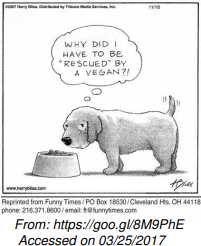Questões de Inglês - Grammar - Questions - Wh-questions
Analyse the comic strip and mark the alternative that answers the question below:

Based on the interviewee’s answer: “Yes I’m very punctual. I always use commas and periods.”, it's possible to infer the question made by the interviewer.
Did the interviewee answer it properly? Why/Why not?
Which question word completes the dialogue correctly?
Peter: wasn't Mary at work yesterday?
Jane: She was ill.
After reading the strip below, you can conclude that the dog:

MY STUDENT LIFE
(A) I live in the __________of Seville with my family in a nice apartment. It’s got a large living room, kitchen and a study. There are three bedrooms, two __________ and a balcony. We live near a park and I often take the dog for a walk there.
(B) I study maths at Seville University. It’s an old building and it’s really __________. I’m in my second year and I love it.
(C) Seville is a fantastic city. It’s quite small but it’s very lively. _________ are outdoors concerts during the spring and summer. Summers are hot in the south of Spain but I __________ it.
(D) I get up quiet early, about 7 a.m. and I __________ a shower. I usually have breakfast at home. I have coffee with milk and toast and jam. But I sometimes have breakfast on my way to __________ with my friends.
(E) I often go home for lunch. We __________ at about 2 p.m. We usually have fish or meat and vegetables.
(In: Sure. HOBBS, M. and KEDDLE, J. S. Helbling Languages, 2015. (Adaptado)
Match the paragraphs A – E (text 2) with the questions 1 – 5 below.
1. What do you do in the morning?
2. Do you like Seville?
3. Where do you live?
4. What do you study?
5. What do you have for lunch?
The CORRECT sequence is
Choose the correct answer to fill in the blank:
" _______________ are you ? "
" I'm sixteen years old. "
INSTRUÇÃO: Responder às questão com base no texto.
TEXT
Crazy Rich Asians: the first all-Asian Hollywood film in 25 years.
Based on Kevin Kwan’s 2013 best-selling novel, the
movie Crazy Rich Asians _____ its inspiration from the
writer’s elite upbringing in Singapore: his grandfather
helped invent Chinese cure-all Tiger Balm, and as a kid
[5] Kevin bred exotic fish that now sell for up to $300,000
each. It is a story about a romantic relationship between
two New York University professors. After dating for
two years, Nick Young (Henry Golding) _____ Rachel
Chu (Constance Wu) to his native Singapore to meet
[10] his family. Once there, Rachel _____ that Nick is
the highly sought-after heir to an enormous fortune,
and any prospect of a future with Rachel in it sparks
jealousy, sabotage and bullying. The “crazy” wealth
of Nick’s family is on an extreme scale: cruise ships
[15] with multiple pools, climate-controlled closets, and
more private planes than cars. But the film’s exotic
flowers and million-dollar gems have been eclipsed by
a far weightier conversation. There is a lack of major
Hollywood roles available to Asian-American actors.
[20] They are given less than 5% of speaking parts: either
because the roles haven’t been written, or they are
marginal.
Director Jon M Chu’s film has already become a
beacon for representation by also exploring the
[25] dynamic that Asian-Americans never feel wholly Asian
or American. His audition announcement calling for
aspiring actors read: “especially for Asian characters
of different shapes, sizes and talents.” “We just really
wanted to open up the process because we know
[30] how hard it is to get in the door”, he said. Asian
actors have struggled to gain visibility in the United
States, an issue cemented in 1930 when Hollywood
enforced the Hays Code, a list of restrictions to keep
films “wholesome” and “moral”. Hollywood may have
[35] stopped enforcing the Hays Code 50 years ago, but
its traditional whitewashing refuses to die. Indeed, one
of the first producers interested in Crazy Rich Asians
asked whether some roles, including Constance Wu’s
Rachel Chu, could be rewritten as Caucasian.
[40] There is a moral imperative among Asian-Americans
to see Crazy Rich Asians. “It’s not a movie, it’s a
movement,” according to Chu. It feels as if viewers
must demonstrate the demand for their stories on
screen – otherwise, another movie boasting an
[45] all-Asian cast might not happen in Hollywood for
yet another 25 years. However, Chu’s film feels
revolutionary in the way it turns a culture clash into a
date-night movie that actually features an Asian couple.
“I know this film won’t represent every Asian American,”
[50] Constance Wu tweeted on 31 July. “So for those who
don’t feel seen, I hope there is a story you find soon
that does represent you. I am rooting for you. We’re
not all the same, but we all have a story.”
Adapted from: https://www.theguardian.com/film/2018/aug/11/ crazy-rich-asians-movie-kevin-kwan-jon-m chu-constance-wu
Which question below is answered in text?
Faça seu login GRÁTIS
Minhas Estatísticas Completas
Estude o conteúdo com a Duda
Estude com a Duda
Selecione um conteúdo para aprender mais:





